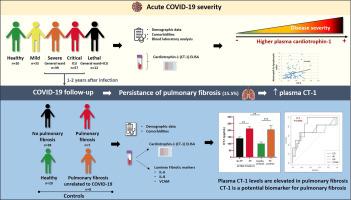Cardiotrophin-1 as a predictor of critical COVID-19, mortality, and persistence of pulmonary fibrosis after the acute phase of infection
IF 3.7
3区 医学
Q2 BIOCHEMISTRY & MOLECULAR BIOLOGY
引用次数: 0
Abstract
Pulmonary fibrosis remains a long-term complication in some COVID-19 recovered patients, particularly in those who suffered from severe disease. Cardiotrophin-1 (CT-1) is an antiapoptotic cytokine related with the progression of fibrotic disease in heart and kidney. This study examines the association between CT-1 plasma levels, COVID-19 severity, and post-COVID pulmonary fibrosis. CT-1 levels were analyzed in patients with asymptomatic/mild (n = 33), severe (n = 39), and critical (n = 57) COVID-19, as well as in those with post-COVID pulmonary fibrosis. Elevated CT-1 levels were associated with a higher risk of severe disease, mortality, and persistent pulmonary fibrosis even a year after discharge. Furthermore, CT-1 was associated with non-COVID-19-related pulmonary fibrosis, suggesting a broader role of this cytokine in chronic lung diseases. These findings propose CT-1 as a potential biomarker and therapeutic target for pulmonary fibrosis and provide new insights for its role in chronic respiratory conditions, such as idiopathic pulmonary fibrosis (IPF), post-COVID interstitial lung disease or chronic hypersensitivity pneumonitis.

心肌营养因子-1作为COVID-19危重症、死亡率和急性期感染后肺纤维化持续性的预测因子
肺纤维化仍然是一些COVID-19康复患者的长期并发症,特别是那些患有严重疾病的患者。心营养因子-1 (CT-1)是一种与心脏和肾脏纤维化疾病进展相关的抗凋亡细胞因子。本研究探讨了CT-1血浆水平、COVID-19严重程度和COVID-19后肺纤维化之间的关系。分析无症状/轻度(n = 33)、重度(n = 39)和危重(n = 57) COVID-19患者以及COVID-19后肺纤维化患者的CT-1水平。CT-1水平升高与严重疾病、死亡率和出院后一年持续肺纤维化的高风险相关。此外,CT-1与非covid -19相关的肺纤维化相关,表明该细胞因子在慢性肺部疾病中具有更广泛的作用。这些发现表明,CT-1可能是肺纤维化的潜在生物标志物和治疗靶点,并为其在慢性呼吸系统疾病(如特发性肺纤维化(IPF)、covid后间质性肺病或慢性超敏性肺炎)中的作用提供了新的见解。
本文章由计算机程序翻译,如有差异,请以英文原文为准。
求助全文
约1分钟内获得全文
求助全文
来源期刊

Cytokine
医学-免疫学
CiteScore
7.60
自引率
2.60%
发文量
262
审稿时长
48 days
期刊介绍:
The journal Cytokine has an open access mirror journal Cytokine: X, sharing the same aims and scope, editorial team, submission system and rigorous peer review.
* Devoted exclusively to the study of the molecular biology, genetics, biochemistry, immunology, genome-wide association studies, pathobiology, diagnostic and clinical applications of all known interleukins, hematopoietic factors, growth factors, cytotoxins, interferons, new cytokines, and chemokines, Cytokine provides comprehensive coverage of cytokines and their mechanisms of actions, 12 times a year by publishing original high quality refereed scientific papers from prominent investigators in both the academic and industrial sectors.
We will publish 3 major types of manuscripts:
1) Original manuscripts describing research results.
2) Basic and clinical reviews describing cytokine actions and regulation.
3) Short commentaries/perspectives on recently published aspects of cytokines, pathogenesis and clinical results.
 求助内容:
求助内容: 应助结果提醒方式:
应助结果提醒方式:


